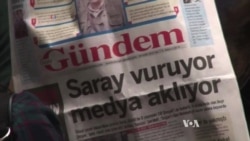Freedom of the press in Turkey is under serious threat, according to a coalition of global media rights groups who have completed an urgent mission to the country ahead crucial parliamentary election next month.
Dozens of supporters of the ruling AK party protested outside the offices of the Hurriyet newspaper last month, after it published an article they claimed contained lies about Turkey’s President Recep Tayyip Erdogan. Days later, one of the newspaper’s columnists was brutally attacked outside his home.
Steven Ellis of the International Press Institute - which organized the mission to Turkey - says this was just one case in a series of chilling moves against press freedom.
“There has been a spiraling increase in defamation lawsuits, or insult criminal cases, by the president in the last year and especially in recent months. Those compounded with firings, with raids on news outlets,” Ellis says.
Journalists from the Dicle agency protested last month against the arrest of several colleagues under anti-terror legislation – which they say is used to suppress reporting of the government’s offensive against Kurdish separatists.
Mohammed Rasool was detained alongside two British journalists from Vice News, reporting on clashes between Kurds and the police. The two Britons have since been deported. Melody Patry of the Index On Censorship was part of the delegation in Turkey.
“But Mohammed Rasool is just one example of the many other journalists and media workers who are being imprisoned and detained for simply doing their job, which is reporting the news, and that is not a crime,” Patry says.
Mehmet Solmaz, news editor of the daily Sabah - seen as broadly pro-government - says Turkey’s critics don’t understand the complex media landscape.
“We do see sort of pressure, but that’s due to mostly media moguls having different agendas,” he says, adding that journalists all too often blur the lines between journalism and politics.
“Most of the journalists in Turkey are acting like an activist, instead of doing what they’re supposed to do, like reporting,” says Solmaz.
The Turkish government turned down an invitation to meet the International Press Institute delegation. VOA requests for a response to the accusations went unanswered.





